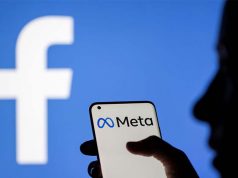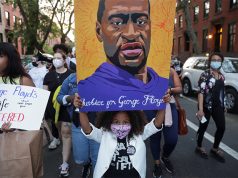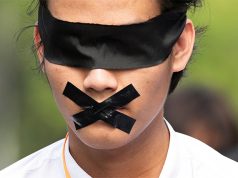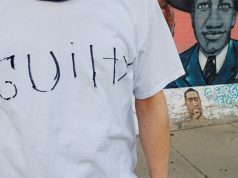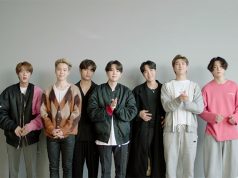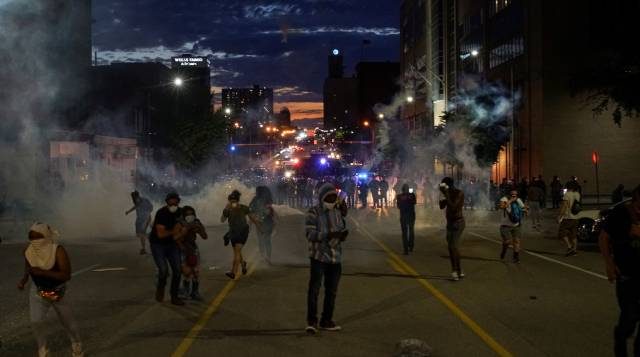
Previous incidents of police brutality in the country were recalled on social media as Filipinos expressed solidarity in the Black Lives Matter movement in the United States.
The Black Lives Matter or BLM movement, which started in 2013, was revived on social media and translated into uprisings in the United States following the death of George Floyd, a 46-year-old black American who was killed by a police officer in Minneapolis.
The hashtag #BlackLivesMatter continued to trend on Facebook and Twitter since last week. Photos and videos which circulated on these platforms showed how police brutality across states turned peaceful rallies into violent ones. Online petitions were also launched to raise funds for various causes related to the long-running global campaign.
READ: Protests, looting erupt in Minneapolis over racially charged killing by police
These posts eventually reached some Filipinos online, who in turn, juxtaposed similar incidents of violence caused by members of the Philippine National Police.
Cases of police abuse in the country
Singer-songwriter Frankie “Kakie” Pangilinan on Sunday shared Floyd’s remark to the police and related it to one of the last words of Kian delos Santos uttered to the police. Delos Santos is a 17-year-old Filipino student who was shot in Caloocan by three police officers carrying out the anti-drug operations in 2017.
while we remember george’s “i can’t breathe”, let’s take a minute to remember kian’s “tama na po”.
— nakakieinis (@kakiep83) May 31, 2020
The slain student’s death triggered widespread condemnation from human rights groups in the country and overseas against President Rodrigo Duterte’s bloody drug war.
Lawyer Gideon Lasco similarly shared other names of people who died in the hands of law enforcers—Delos Santos, Floyd, Trayvon Martin and Winston Ragos, a former soldier who was shot dead by a cop last April.
“To be black in America, to be poor in the Philippines, is to be presumed guilty and denied mercy. It is to be on the receiving end of police brutality for which we must respond with solidarity and resistance,” Lasco said.
Karapatan member Philip Jamilla, meanwhile, shared a video of the Manila police officers’ violent dispersal of indigenous groups protesting in front of the United States Embassy in Manila in 2016.
In 2016, indigenous people's groups marched to the United States embassy in the Philippines to protest the imperialist-directed militarization, development aggression and landgrabbing in their ancestral lands.
The Philippine police protected who? pic.twitter.com/qzMrLrvXIa
— Philip Jamilla (@pmjamilla) May 31, 2020
“The Philippine police protected who? The answer: Philippine police protected imperialist interests—in this case, the United States,” Jamilla said.
“The police is also currently protecting China’s imperialist interests now, but it is also necessary to state that the police is and has always been an apparatus of American imperialism,” he added.
Twitter user @2020CheGuevara also recalled the alleged mauling of a factory worker who supposedly violated quarantine rules in Cavite last May.
Remember him? He's a victim of police brutality in the Philippines. https://t.co/WU3dHA1j4G
— Patch #FreeLumad26 (@Bebe_bh0i) May 30, 2020
The PNP report, however, stated a story that the worker’s injuries were self-inflicted, which medical experts criticized as false.
Local artist Camila Sunn also cited the constant police brutality toward indigenous groups in the country and the bloody drug war, which killed thousands of Filipinos since 2016.
please read. pic.twitter.com/kUfTKswqHA
— sunn (@pusangkalat) May 29, 2020
“Our indigenous people are literally driven out of their lands and forced to live on the streets. The poor are majority of the extrajudicial killings, use your platform to speak out,” Sunn said.
She also called out some Filipinos’ usage of the n-word and their tendency to appropriate “black culture.”
“Majority of the slang, culture, music, art, fashion, trends, etc. that you know have also came from black culture—most of them are stolen or appropriated. You can’t love black culture if you don’t support black lives,” she said.
Human rights abuses during COVID-19 quarantine
New York-based Human Rights Watch previously released reports of incidents of human rights violations against quarantine violators, mostly children, since the directive was imposed last March.
Rights group Amnesty International likewise criticized “a heightened pattern of misconduct perpetrated by barangay officials when implementing quarantine protocols.”
READ: Poor workers trying to feed families jailed, abused in coronavirus lockdowns
Cases vary between locking up young violators in enclosed places, thus violates social distancing rules, and shaming them on social media.
Last April, the PNP reported that nearly 30,000 violators have been arrested nationwide.
There were also cases of a “sex-for-pass” scheme of some members of law enforcement who man checkpoints against prostituted women during the lockdown.
PNP Police chief Gen. Archie Gamboa said that victims should personally file their complaints to open courts to persecute the perpetrators.
Black Lives Matter in the United States
A video showing Floyd’s fatal arrest last May 25 fueled the protests in the United States which initially called for justice for the victim until it later on became a nationwide campaign for equal rights for all black Americans and people of color.
Based on international reports, the civil unrest started from Minneapolis and set off into other states such as New York, Louisiana, Washington D.C., Florida, California, and Georgia.
The National Guard, a component of the US Army, was also deployed in most of these places to handle these massive rallies.
Several US personalities Halsey, Ariana Grande, Kehlani and Michael Jordan also participated in these protests last weekend.
Some of them even showed videos of US police firing rubber pellets at them despite their peaceful demonstration.
On Tuesday (Philippine time), “Riverdale” star Cole Sprouse was arrested along with “peaceful protesters” in Santa Monica.





